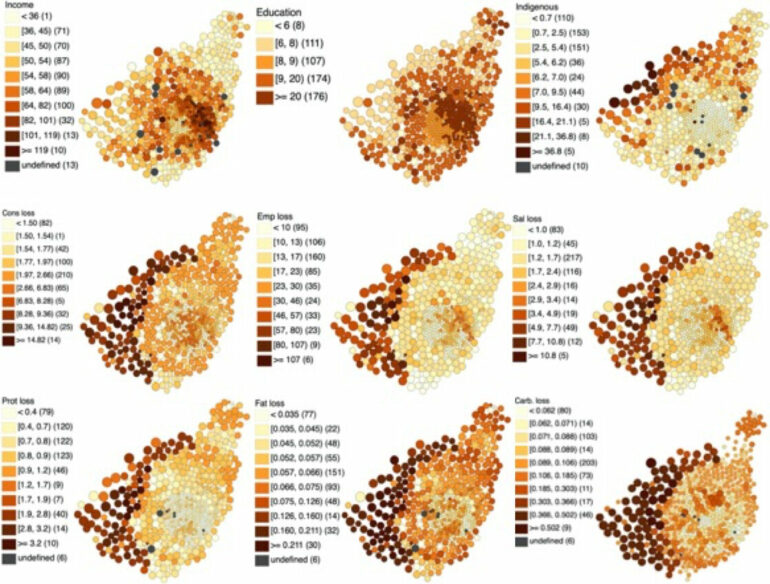Modeling shows climate change and extreme weather events will impact food supply chains, with adverse effects on income, food and nutrient availability. Rural communities would be most severely impacted—while more affluent communities would be better positioned to buttress against supply shocks.
New University of Sydney research published in Nature Food today has modeled the wide-ranging impacts of climate change and extreme weather events on Australia’s food systems and supply chains, identifying potential cascading repercussions including job and income loss as well as a loss in nutrient availability and diet quality.
Led by Dr. Arunima Malik from the Integrated Sustainability Analysis group in the Faculty of Science and the School of Business, the paper analyzed the climate change impacts across different sectors and regions in Australia. The researchers found that climate change and extreme weather events have impacts across communities, with rural regions the most adversely impacted.
The study also found that climatic events, such as cyclones, floods, bushfires and heat waves could affect surrounding areas by way of limiting food availability and employment. The effects of these events could be felt in distant regions due to the complex interconnectivity of modern supply chains.
The authors develop an integrated modeling framework for tracing how reductions in food supply have impacts on non-food sectors, such as transport and services.
“Climate change can directly impact our economy, livelihoods and health. Disruptions caused by extreme weather events can cascade across regions and sectors, resulting in job and income losses and impacts on food availability,” said Dr. Malik who was a lead author of the IPCC’s Sixth Assessment Report.
“Our study has sought to model the indirect supply-chain repercussions of these events to bolster our understanding of interconnected supply chain networks and to promote climate preparedness,” she said.
Previous research undertaken by the Integrated Sustainability Analysis group has shown that a localized disaster (such as a cyclone in Queensland) can impact every other Australian state, resulting in losses across primary, secondary and tertiary sectors.
“What plays out globally seems to play out locally as well. Everyone is affected by climate change, even if they’re not in areas directly hit by extreme weather, and the vulnerable are affected most,” said study co-author and Professor of Sustainability Research from the Faculty of Science Manfred Lenzen.
The modeling also found that such impacts could lead to localized food price increases and diminished food quality, with poor households faring worse than affluent counterparts even in the same area.
Co-author, Professor David Raubenheimer from the Charles Perkins Center said, “Disruptions to food supply can negatively impact diet quality, through reducing the variety that contributes to a balanced diet, diverting diets to unhealthy processed foods that have a longer shelf life. This disproportionately impacts vulnerable groups, who do not have the means to pay escalating prices for scarce fresh foods.”
Co-author Dr. Sinead Boylan, a public health nutrition researcher in the Sydney Environment Institute, said, “This research highlights that climate change may not only affect food supply in NSW, but access to healthy and equitable diets, particularly among the most vulnerable populations. These findings could help inform mitigation strategies to help these communities adapt.”
Impacts on food production would also lead to an impact on employment and income losses not just in the food supply chains, but also in the transportation and service sectors.
The research was based on a methodology which integrated a nutritional framework with regional supply chain impacts and employment and income loss models, providing a holistic view on the impacts of climate change and extreme weather events.
“Frameworks such as this could well be used to inform decision-making processes by governments and other organizing bodies. It is vitally important that communities and organizations have an awareness of these impacts to encourage better mitigation planning and climate change resilience,” said Dr. Malik.
“The cascading effects, generated by continuing climate variability and more frequent extreme weather events, not only disrupt supply chains, but may also trigger zoonotic diseases, foodborne epidemics, and broad socio-demographic stresses, including inter-regional migration and social unrest. It’s vital that we understand these impacts so we can build a more resilient society,” she said.
More information:
Arunima Malik, Impacts of climate change and extreme weather on food supply chains cascade across sectors and regions in Australia, Nature Food (2022). DOI: 10.1038/s43016-022-00570-3. www.nature.com/articles/s43016-022-00570-3
Provided by
University of Sydney
Citation:
Climate change threatens food supply chains with impacts on diet quality, income (2022, August 18)



